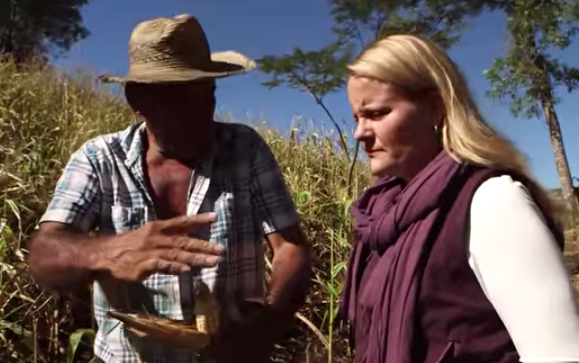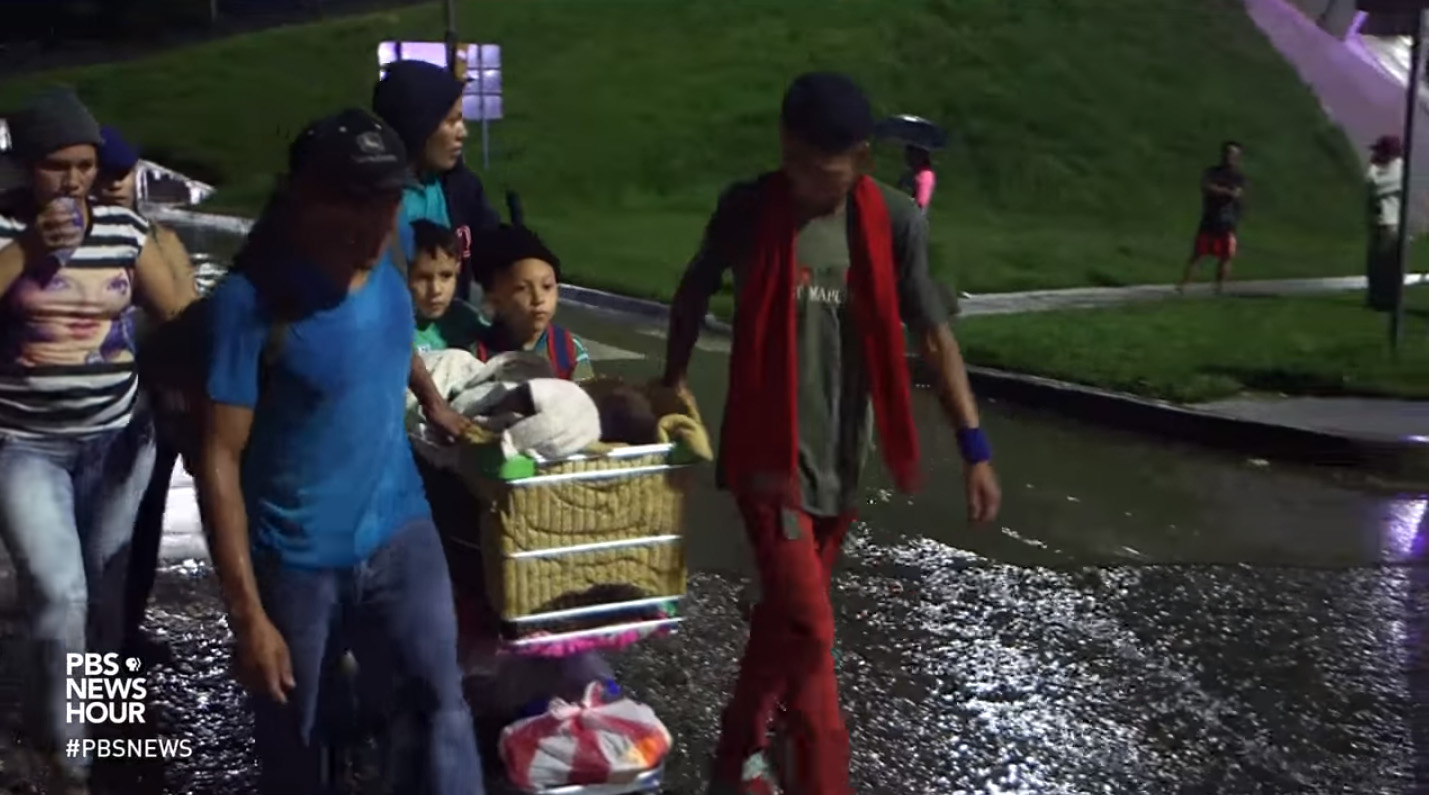Despite the ongoing immigration debate, with its polarization and publicity, thousands of migrants are still embarking monthly upon the arduous trip to the U.S. border. Why are families fleeing Central America, knowing the journey will be dangerous -- and very likely futile? Special correspondent Marcia Biggs reports on the gang violence and so-called "war tax" driving Hondurans from their homes.
Read the Full Transcript
Judy Woodruff: Now to the immigration turmoil at the U.S.-Mexico border, where customs and border control officials say they are on track to make 100,000 apprehensions this month alone.
Many of those people come from Central America. And even as the president again threatened this week to withhold aid and shut the border because of the migration, his administration signed a pact with several of those same nations to bolster their internal security.
With the support of the Pulitzer Center, special correspondent Marcia Biggs and videographer Julia Galiano-Rios recently traveled to San Pedro Sula in Honduras to see why so many are fleeing their home.
Marcia Biggs: They came from far and wide, migrants from all parts of Honduras, gathering at the bus station in San Pedro Sula and settling in for a long night of camping out, before a dawn departure.
It wasn't clear why or who made the decision, but eight hours earlier than planned, this caravan of families set off on the harrowing journey to the United States. It wasn't long before the weather turned nasty, but the people pressed on.
Some have suggested that the caravans were organized by political activists, but there was no organization here, only desperation.
They were supposed to leave at 5:00 in the morning tomorrow, but they left at 9:00 in the pouring rain. You have got entire families with toddlers, babies. They have got nothing but the clothes on their backs, and they don't even really know where they're going. They're just following the crowd, hoping for a better life.
"I know that it will be difficult journey," says 19-year-old Alicia, as she cradles her 8-month-old baby, "but I want a better life for my son."
Olman del Cid says he had no choice but to start walking with his wife and five children.
Olman del Cid: It's too dangerous here. We can't stay here. There is no work, and I can't afford to pay the extortion.
Marcia Biggs: Their numbers were nothing like the some 7,000 that marched through Central America and into Mexico last October. Estimates put this group at around a third of that, but they are no less determined.
Yolanda Gonzalez has worked as a human rights activist in Honduras for the last 17 years.
Yolanda Gonzalez Cerdeira: It's like one boy told us: "Why am I leaving? Because, in my neighborhood, you're more likely to get shot than to find a job."
When you ask people why they are leaving, or why, once deported, they try to go back, the story typically starts with, well, I'm leaving for economical reasons.
But when you start to inquire further, they say, I had my bodega, but I lost it because of extortion, violence and because I don't have anyone to report to who can protect me. I can't go to the police because the police won't protect me, and what's more, I'm afraid of the police. Therefore, I have no other choice but to leave. And if I get deported, I will try again.
Marcia Biggs: San Pedro Sula used to be the murder capital of the world, held hostage by gangs, the most prominent, MS-13 and the 18th Street Gang. But a crackdown led by the government of President Juan Orlando Hernandez, fueled by American dollars, has led to a much touted decrease in homicide rates, down over one-third since 2011.
Yet the people still live in fear.
But we keep hearing that the homicide rates are down, that crime is down, violence is down. Do you not believe that?
Yolanda Gonzalez Cerdeira: No.
I think there are a lot of tricks there. Sometimes, a half-truth is more harmful than a lie. Oddly enough, the homicide rate started to fall when the counting methodology changed. Now only police can give that data. Before, the data was compared with other sources. Now it's just one source.
Marcia Biggs: Representatives of the government didn't grant our interview requests. But everyone we spoke to talked about extortion by gangs, a concept so normalized, it's referred to as war tax.
As we drove around some of the poorest neighborhoods in San Pedro Sula, we saw home after home abandoned by those who couldn't afford to pay; 33-year-old Gabriella Gonzalez is one of those people, too scared of the gangs to let us show her face.
She lived illegally in the United States for eight years, finally making enough money to buy three cars and start a small taxi company. She returned to her country full of hope.
Gabriella Gonzalez: It went well during the first year. In 2014, I started to pay the first war tax. By the middle of the following year, I got the other war tax. Then it was two war taxes. I endured. I thought I could. When I got the third war tax, I said, no more.
Marcia Biggs: To pay one war tax is normal, but you just couldn't handle three.
Gabriella Gonzalez: Yes. They don't care if you're sick, if you have someone in the hospital, or if your car broke down. Even if you don't want to be involved, they will get you involved. Do you understand? When they look for you, they already know all your moves.
Marcia Biggs: Do you know of other people that haven't paid the war tax?
Gabriella Gonzalez: People who are now under the ground.
Marcia Biggs: She says her husband got sick last year, and they got behind in their payments. One day, a truck pulled up to their home and five men got out, giving them 15 minutes to come up with the cash. She says they stalled them and ran.
What do you think would have happened if you hadn't run away, if you hadn't left?
Gabriella Gonzalez: I wouldn't be sitting here telling this story.
Marcia Biggs: They are now living in hiding. Gabriella's changed her hair and rarely goes outside. She and her mother run a small restaurant out of the house, but, today, we were the only customers. They sold their nest egg of taxi cabs, keeping one just for emergencies, a constant reminder of the hope they once felt, which was dashed in an instant.
Gabriella Gonzalez: On one Sunday afternoon, we had to make the decision to leave, running away from our own country. I'm telling you, I wouldn't be sitting here. My whole family would be under the ground, because this has happened to other families who didn't pay the war tax. They start by taking your work, your income. Then they take your life.
Marcia Biggs: Like most Hondurans we met, Gabriella never filed a report and therefore has no evidence of the threats.
Yolanda Gonzalez says, reporting crime accomplishes nothing.
Yolanda Gonzalez Cerdeira: I understand that, in the United States, when people are apprehended, they are told, but you didn't file a report.
Of course, if you casually ask someone here why they didn't file a report, they would answer, what for, when it doesn't do anything?
Marcia Biggs: We went to talk to police in Rivera Hernandez, one of the toughest areas controlled by gangs. They took us to some of the areas they say they have taken back.
We have been in this neighborhood several times, and always with members of the local community. And it's been really difficult to film. It's been a struggle, I mean, highly sensitive, because they kept saying, oh, you know, the gang is always watching.
Now we're here with police. And, of course, the access is great, but nobody will talk to us. Everyone has retreated into their homes. There's a real culture of mistrust.
They took us to an area which they say used to be a dumping ground for bodies. They're proud of the lowered murder rates and claim to have taken back this neighborhood. But it's practically deserted. While the government statistic on violence may be down from a peak in 2011, the murder rate here remains among the highest in the world.
And it's fear that drives people out. We were told that five families from this street alone left on the latest caravan. Gabriella's sister is an American citizen and has filed a petition to bring her to the U.S. legally. But Gabriella says that she can't wait any longer and will try to go anyway, even though it may hurt her case if she tries to cross illegally.
Have you heard what people are saying in the United States about people coming from Honduras?
Gabriella Gonzalez: That they treat us like animals, that we are going to contaminate the United States, that most of us are bad people.
It's not like that. As with everything else in other countries, there are bad people and good people.
Marcia Biggs: Are you worried about what will happen to you when you get there? You could be detained. You could be separated from your grandson.
Gabriella Gonzalez: Yes, it worries me. It worries me a lot, because I know that they won't understand my situation.
Marcia Biggs: So, even though you know you may not make it, you're still going?
Gabriella Gonzalez: Yes, for my children. I know they are going to have something better in every way. You don't have the freedom for that here. You don't have the freedom for anything.
Marcia Biggs: A week later, Gabriella left Honduras with her daughter and grandson, setting off for the brutal journey north.
For the "PBS NewsHour," I'm ®MD-BO¯Marcia Biggs in San Pedro Sula, Honduras.
Judy Woodruff: So important to report this. And an update: Since Marcia filed her story, unlike so many who try and fail, Gabriella actually made it across the border. She is currently in the U.S. and beginning the process of applying for legal asylum.
Tomorrow, the series continues on "PBS NewsHour Weekend" with a closer look at one of the poorest and most dangerous neighborhoods in San Pedro Sula and how members of the community are trying to help those left behind.

Education Resource
Meet The Journalist: Marcia Biggs
In this four part series, Marcia Biggs visits some of the most dangerous neighborhoods in San Pedro...




